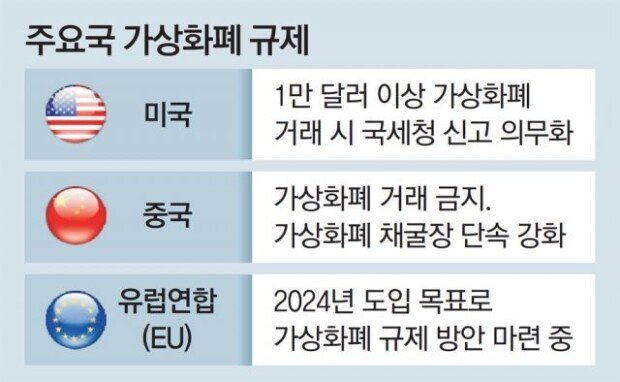U.S. to crack down on cryptocurrency transactions
U.S. to crack down on cryptocurrency transactions
Posted May. 22, 2021 07:24,
Updated May. 22, 2021 07:24

Following China’s new crackdown on the use of cryptocurrencies, the United States has moved to impose stricter cryptocurrency rules. With the high volatility of cryptocurrencies taking a toll on investors in recent weeks, governments around the world are seeking ways to address the issue. Experts predict that such move by governments around the world will increase regulatory risk, thereby significantly discouraging cryptocurrency investment.
The U.S. Treasury Department announced on Thursday (local time) that any crypto transfers worth more than $10,000 must be reported to the Internal Revenue Service (IRS). “Cryptocurrency already poses a significant detection problem by facilitating illegal activity broadly including tax invasion,” said the department. “As with cash transactions, businesses that receive cryptoassets with a fair market value of more than $10,000 would also be reported on.” There have been speculations on Wall Street that relevant authorities, such as the Treasury Department and the U.S. Securities and Exchange Commission (SEC) could soon take a more active role in cryptocurrency regulation, the CNBC reported.
The announcement by the U.S. government, following a similar move by China, is expected to constrain the global crypto market from rising further in value.
Chinese regulators are also taking steps to crack down on crypto miners on top of its new restrictions announced on Tuesday, which ban the transaction or the use of cryptocurrencies.
The European Union also plans to implement cryptocurrency regulations by 2024, which apply to all 27 member countries. According to the Financial Times, the central bank of Turkey banned the use of cryptocurrencies to purchase goods and services on April 30.
The price of Bitcoin, the most popular cryptocurrency, slid on the news of U.S. regulation on Thursday. Bitcoin was traded near $42,000 in the morning but dropped below $40,000 at one point in the afternoon.
Jae-Dong Yu jarrett@donga.com




![17년 망명 끝에, 부모 원수 내쫓고 집권[지금, 이 사람]](https://dimg.donga.com/c/138/175/90/1/wps/NEWS/IMAGE/2026/02/18/133376197.3.jpg)

![[단독]위기의 K배터리…SK온 ‘희망퇴직-무급휴직’ 전격 시행](https://dimg.donga.com/c/138/175/90/1/wps/NEWS/IMAGE/2026/02/20/133389142.1.jpg)
